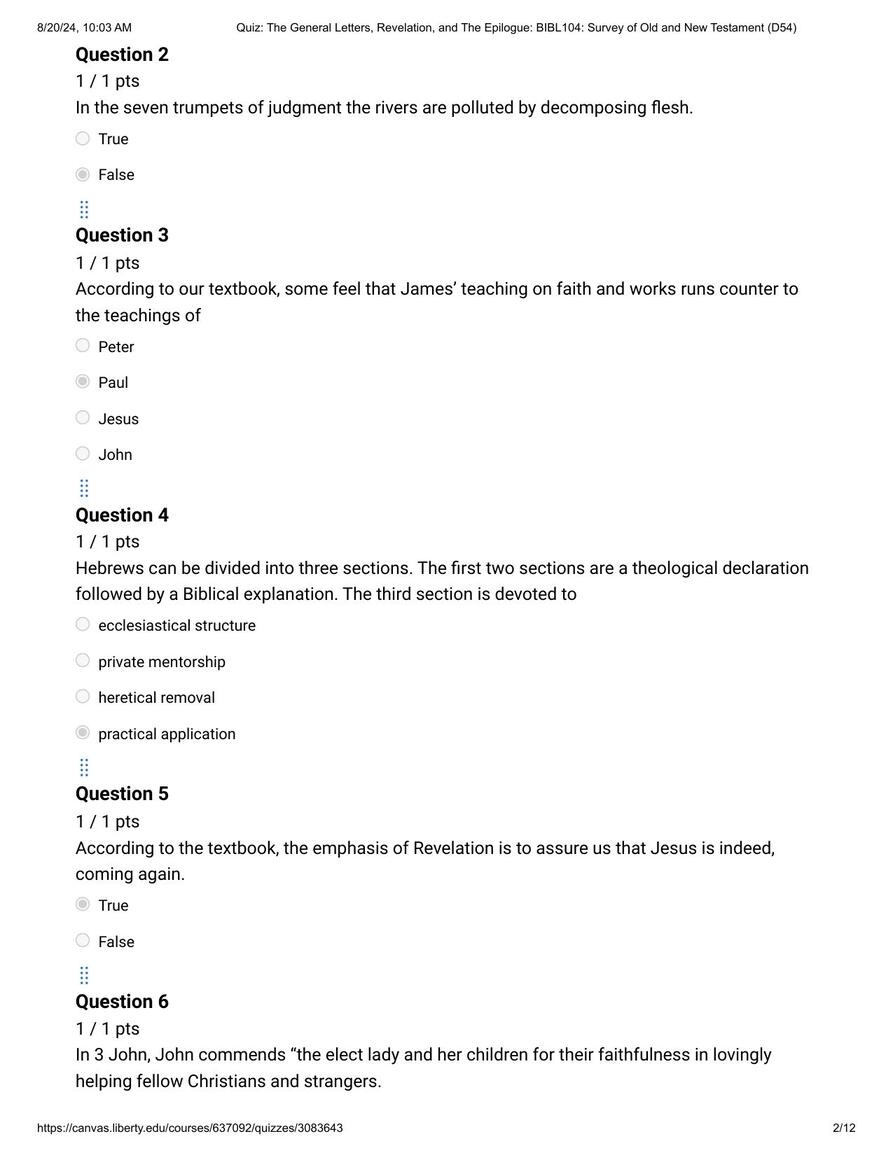BIBL 104 Bible Dictionary 2
BIBL 104 Bible Dictionary 2 Liberty Answers
For these 2 distinct projects, imagine you are writing a series of short articles for a Bible Dictionary. As we have seen in our study, Bible dictionaries are useful tools to learn more about the books, people, and places we encounter in Scripture.
Your task will be to write:
- Three concise 250-word articles about a book, person, and place from the Old Testament (Due at the end of Module/Week 5).
- Three concise 250-word articles about a book, person, and place from the New Testament (Due at the end of Module/Week 8).
Clarification: You will not write thee articles about an OT book, and three articles about an OT person and three articles about an OT place. You will write three articles only, one each for the three topics.
Content Guidelines: Choose one book, person, and place from the list of the provided topics for each of the 2 projects.
Your article must include the following per item:
Book:
Your biblical book article must include: The basic literary genre, authorship, date written, key themes, purposes, major events, and main personalities. Identify each of the elements in your content. For example, “The key themes of the book of Galatians are….” Please note that “themes” is plural. If you don’t use the terms associated with the element it won’t count as part of your article. Also note that the grading rubric does not specify it but implies that all seven items are required.
Person:
This article must include: The dates of the character’s life, place of birth, summary of their role or positions held, defining events in their life and work, contemporaries (other biblical characters they are associated with, and so on.), and their legacy. Again, you must identify the elements in your statements. For example, “The legacy of Joshua is ….” If they are a biblical author, list the related works.
Place (i.e., municipality, kingdom, empire):
This article must include: The keys dates (i.e., founding and demise), clarification of the location (regional description, the relevance of the place from a biblical/Ancient Near East (ANE) perspective, associated biblical books where it is a backdrop or central location), key attributes (religion, commerce, key figures, and other pertinent information.), and associated biblical books. Choose a topic for which you can easily find information. These are geographical items and should have a focus on those data points and not about the events that occurred there.
Formatting Guidelines:
- Use one Word document for each stage of submission (That is, all of your Old Testament Bible Dictionary articles will be on one document, and all of your New Testament Bible Dictionary articles will be on a single document).
- Use 12-point, Times New Roman font.
- Save your document according to the following filename formats:
- Module/Week 5 – LastnameFirstInitialOTBDP.doc (Example: DoeJOTBDP)
- Module/Week 8 – Lastname_FirstInitialNTBDP.doc (Example: DoeJNTBDP)
- Use the Bible Dictionary Project Template to format your summaries.
Submit the assignments to SafeAssign by the end of the assigned module/week. The first project is due by 11:59 p.m. (ET) on Monday of Module/Week 5. The second project is due by 11:59 p.m. (ET) on Friday of Module/Week 8.
To repeat: you will write an Old Testament dictionary paper with three articles. One article on an Old Testament book of the Bible, one article on an Old Testament person and one article on an Old Testament place. This is due in Week 5.
You will write another paper of three articles for the New Testament. One article on a book of the New Testament. One article on a personality of the New Testament and one article on a New Testament place. Note, there is a list of topics to select from in the “Content” area. Caution: if you choose for instance “Patmos” for your place article you will be challenged to find 200 words of content. You are still held accountable for the minimum word count. So I recommend choosing some other topic. This project is due in Week 8.
And, here are some tips to help you score well.
- Review your writing project before you submit it. Run spell and grammar checks. Have someone read your writing project to see if it flows well and is organized.
- Write as if you have someone (besides the professor) is reading it…an audience if you will. This way you tend to include information the reader needs for a good overview.
- Write your own material. SafeAssign reveals your sources to the professor. You must cite your information. Do not copy material from blog sites of former students who have uploaded their BIBL 104 or 110 assignments. Don’t even use them as sources. It is plagiarism per the Liberty Way.
- Use outside sources so you can be exposed to additional detail on the topics you are researching. Show some effort rather than just utilizing what is in your textbooks.
- Use your own writing flair. Keep it academic but interesting if you can. In academic writing assignments the first person is not used. That is, “I”, “me,” “my,” “we” and so on are not used.
- Work ahead or pace yourself on the bigger assignments so you don’t have to do a Monday Nite special. Those are painfully obvious.
- The minimum word count isn’t the most desired number to work with. It is very challenging to summarize a larger book of the Bible like Isaiah or Ezekiel in 200 words.
- Don’t’ write the assignments “for the instructor.” Think of these articles as contributions to your own ministry of the Word for later use.
- Have fun!
